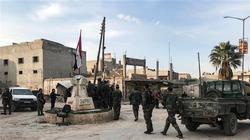 Syria has managed to score a victory in the nine-year war, while Turkey is "pulled agonizingly" in several directions, says a former deputy director of the US spy agency CIA.
Syria has managed to score a victory in the nine-year war, while Turkey is "pulled agonizingly" in several directions, says a former deputy director of the US spy agency CIA. RNA - "Syria’s [President Bashar] Assad has won — at least militarily, "John McLaughlin wrote in an article titled "SYRIA: IS THE END GAME APPROACHING?".
The Syrian army has been fighting against a host of foreign-backed terrorist groups, which have been wreaking havoc on the country since 2011.
The Damascus government has managed to win back control of almost all regions from Takfiri elements.
Syria has now been engaged in a liberation operation in Idlib Province, the last major bastion of terrorists in the country.
The recent sweeping Syrian army gains, however, have coincided with a massive deployment of troops and military equipment by Turkey, which is evidently upset by changing conditions on the ground.
Ankara backs militants fighting to topple the Damascus government. Those elements continue to target Syrian troops and allied Russian personnel.
In turn, the US has been supporting anti-Damascus Kurdish militants and at the same time stealing Syria’s crude oil resources.
Analyzing the situation in Idlib, McLaughlin wrote that while Syrian government forces are advancing from the south, NATO member Turkey "is pushing back".
"Turkey is pulled agonizingly in multiple directions. It opposes Assad’s advance but doesn’t want to fight Russia, with which it tries to maintain good relations in hopes of influencing an eventual Syrian political settlement, particularly the future of the country’s Kurds," he added.
"Ankara sees Syria’s Kurds as allies of Kurds in Turkey, who are viewed as terrorists and separatists by Turkish leaders. Meanwhile, Turkey’s refusal to absorb more refugees strains its relations with Europe. And its harsh policy toward the Kurds has often put it at odds with the US, its chief NATO ally often closely partnered with the Kurds in Iraq and Syria."
Anti-American sentiment is currently running high in Syria where the US is maintaining a military presence under the guise of fighting Daesh.
Earlier this month, a US military convoy was forced to retreat from an area in Syria’s northeastern province of Hasakah after government forces blocked its way and groups of angry local residents threw stones at it.
"The United States, thanks to its hesitant policy during the [Barack] Obama administration and its erratic one under President Donald Trump, has forfeited most of its influence in Syria and over its future," McLaughlin wrote.
"With the US drawdown and the changing mission definition — now oddly one of protecting Syria’s negligible oil — Washington has left the region and Syria’s other players uncertain of its intentions and doubtful of its seriousness and staying power."
He concluded, "Strategically, the US has probably lost more than we can now realize."
847/940